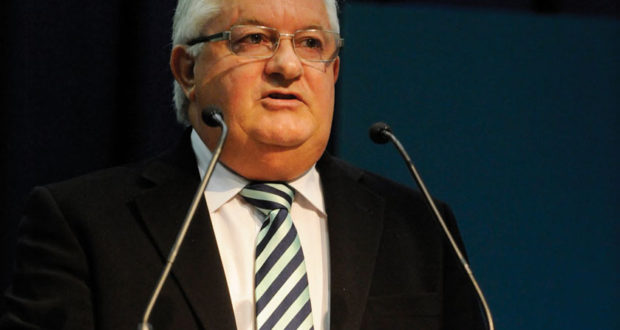IPA Chairman Stephen McMahon reports from a pivotal symposium at the Health Ageing Workshop, presented by the Global Coalition on Ageing, at the International Federation on Ageing Conference in Prague.
Every now and again you leave a symposium or a meeting where you know something important has happened: a light has been thrown on a problem that some people had not really noticed before and they are in a position to do something about it, and this illumination is in the best interests of patients — everywhere.
The symposium, moderated by Dr Michael Hodin, Executive Director of the Global Coalition on Ageing, addressed the topic, ‘Adult Immunisation: A Central Driver of Prevention and Wellness’. The session highlighted the importance of adult vaccination and, particularly, the importance of vaccinations in a rapidly-ageing world and the natural degeneration of immunity systems associated with growing older.
This issue calls for urgent attention to the need for new health and prevention programmes to enable our communities to be active and productive across their life span.
However, I learned that one should be careful in defining ‘the elderly’, as there is a concern that age segmentation can marginalise societal response to the needs of those who progress through the chronological lifeline.
Dr Jane Barratt, Secretary General of the International Federation on Ageing, said of ageing: “We all start ageing from the moment of birth” — with one destination, I might add!
Enabling tools
This rich statement triggers the need for a whole range of enabling tools to ensure that the right supports are in place, including economic sustainability. Emotional and societal support, leadership, governance and accountability are seamlessly interconnected to enable the global citizen on this fragile village earth to live within a new paradigm that being, living in the ‘spaciousness of health’, which is sustained, enabled and extended by proactive measures.
Let me explain: wisdom is not confined to any age group. Recently, a 16-year-old Irish girl, Joanne O’Riordan, born with no limbs from a very rare disorder (Total Amelia Syndrome), gave an inspiring address to the United Nations International Telecommunications Union in New York. She said: “Technology has made me even more determined to achieve a better standard and quality of life. I always think if I can do this now, what would I achieve in the future?” She finished her speech to great applause: “Just because I have no limbs does not mean I shall be limited — and neither should you.“
This is, I believe, the spaciousness of health, regardless of age, disability, chronic illness, or whatever.
Challenges
Some challenges to adult immunisations that were highlighted by the panellists included the low uptake of adult vaccinations by at-risk groups, including healthcare workers and the need to support frontline workers, in addition to raising public awareness of new vaccines, such as a vaccine for shingles.
I believe that nature, with its ongoing evolution, has been sidelined in favour of lifestyle diseases by some of the advertising media moguls. A lifestyle disease is associated with the way a person or group of people lives. They include heart disease, stroke, obesity and type 2 diabetes. Changes in lifestyle, consumption and regular physical activity help prevent obesity, heart disease, hypertension, diabetes and premature mortality. In the US alone, the value of the weight-loss industry is worth a massive $60 billion. With the size of this industry, are the media moguls overselling lifestyle as the cause and change in lifestyle as the main solution, when overweight is a message from nature that we have a problem? Let’s be vigilant and make sure that nature is not sidelined to lifestyle and the public are made more aware of the present arsenal and emerging bugs that nature has and the need for ongoing vaccinations through our life cycle to protect us and give us a fighting chance. Bill Gates talks of the “miracle of vaccinations”, which through our ingenuity can and do save lives.
Successes
Successes surrounding adult immunisations were reported by Prof Roman Prymula, Chairman, Central European Vaccine Advisory Board, who explained how vaccinations can be effective as we age, when immune systems weaken. Mr Michael Waldholz, Pulitzer Prize-winning journalist and author, illustrated that the experiences of childhood immunisation programmes, such as GAVI and other health-related movements — i.e. HIV and AIDS — show a positive impact on health.
What really demonstrates the effectiveness of the Bill and Melinda Gates Foundation? The Foundation has pledged $10 billion up to 2019, which will save the lives of almost 9 million children from diseases such as measles, severe diarrhoea, pneumonia and polio. This is not counting the future generational expansion springing from these children whose lives have been saved.
The International Federation on Ageing (IFA) (www.ifa-fiv.org) has identified the preventative measure of adult immunisation as a key work programme. The International Alliance of Patients’ Organis-ations (IAPO) principles of patient-centered healthcare will strengthen the process to advance the recognition of this preventative measure and ensure the patient’s voice is heard as programmes are developed.
I’m confident that there are mutual opportunities for both the IAPO and the IFA in promoting such programmes that will sustain the spaciousness of health for millions of patients everywhere.
Change and reform in our healthcare systems should not be preceded by funerals and potentially-avoidable illness. The evidence is in — immunisations across the life course save lives. Time will tell if the Prague Illumination was a spark or torch; either way it’s up to you and me to protect it.
Stephen McMahon is the Chairman of the Irish Patients Association and Governing Board Member of the International Alliance of Patients’ Organisations (IAPO).
Source: Irish Medical Times
 Global Coalition On
Global Coalition On 